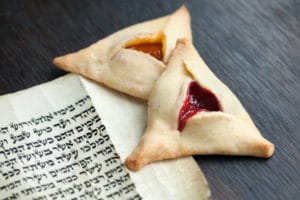-
06 March 2020
A reflection from Avi West, Master Teacher of Federation’s Jewish Leadership & Learning Department

Hamentashen and a megillah for Purim
As Purim approaches, many of us look forward to the costumes, the carnivals, those triangular pastries with myriad fillings, and “scrolling” through the Book of Esther, with noisemakers at the ready. But the essential message of Purim is more relevant now than ever. Purim serves a unique role in the Jewish holiday cycle; it is the only global commemoration of a Diaspora Jewish community facing an existential threat, where God’s role is hidden while the community leaders step up to save the day.
This idea that Jews can take charge of their own destiny rather than await divine intervention has its roots in the Purim story and culminated with the Zionist movement. The term “Zionism” was coined in 1890 by Nathan Birnbaum to refer to the return of the Jewish people to their homeland and the resumption of Jewish sovereignty in the Land of Israel. But the engine that propelled Zionism into a deeper national political and spiritual movement began much earlier, and it empowered Jews with “sacred chutzpah.”
Rabbi David Hartman wrote extensively about the continuous progression of the God-human covenant, where people move from merely keeping God’s commandments to assuming responsibility for interpreting and applying them. Interpretation of law and ritual made people even more essential partners with God.
But it was the emergence of Zionism in 19th-century Europe that Hartman claims rejected the traditional posture of waiting for messianic redemption and took of the spirit of covenantal responsibility to a new level. Hartman argues that “we are responsible not only for maintaining our own moral conscience and for taking on the role of interpreting God’s law for our time and place, but we are also responsible [for taking] an active role in shaping our destiny.”
In the Purim story, Mordechai prevailed upon Esther to take an active role in saving her people when Haman was threatening to have all the Jews in Shushan killed. “Perhaps you have attained to royal position for just such a crisis,” he says.
The part of Zionist ideology that champions the power of human agency to shape our destiny may have started in Shushan, but it is applicable to Jewish communities around the globe. From the start, Purim was ordained as a day of feasting and merrymaking, and as an occasion for sending gifts to one another and to the poor. The antidote to threats to our community is to build and strengthen our community, to take responsibility for the needs of our neighbors.
Yossi Klein Halevi, a senior fellow at the Shalom Hartman Institute in Jerusalem, puts the impact of human initiatives in deciding our destiny into a balanced equation so that it speaks to us today. He points to two biblical commands to remember. The first is to remember we were strangers (slaves) in a strange land (Egypt), resulting in the command, “Don’t be brutal.” The second is to remember how the Amalekites attacked the Israelites without provocation while wandering in the wilderness. The message here is “Don’t be naïve.”
Klein Halevi continues: “The first command is the voice of Passover, of liberation; the second is the voice of Purim, commemorating our victory over the genocidal threat of Haman, a descendant of Amalek. ‘Passover Jews’ are motivated by empathy with the oppressed; ‘Purim Jews’ are motivated by alertness to threat. Both are essential; one without the other creates an unbalanced Jewish personality, a distortion of Jewish history and values.” Combining both motivating commands to remember can help us create a destiny built on core Jewish values with global sensibilities.
This year, make Purim more than “they tried to kill us, we won … let’s eat.” Use the day and its wisdom for the ages to continue building our Jewish community by responding to the needs of our neighbors.
When we take individual responsibility to welcome our neighbors, to interpret God’s commandments for ourselves, and step up and lead courageously like Esther, we can blot out the memory of “he who shall not be named without noise,” and build a community that is a force for good in the world.
